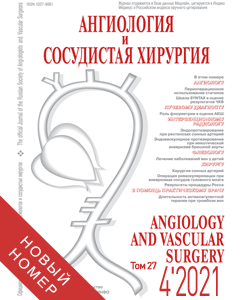Journal «Angiology and Vascular Surgery» •
2020 • VOLUME 26 • №4
Early surgical myocardial revascularization as an effective method of treating patients with acute coronary syndrome
Shneider Yu.A., Tsoi V.G., Fomenko M.S.
Federal Centre of High Medical Technologies, RF Ministry of Public Health, Kaliningrad, Russia
Background. One of the main methods of treating patients with acute coronary syndrome (ACS) is percutaneous coronary intervention (PCI), however in patients with multivascular, abnormal, or technically complicated coronary lesions, early surgical myocardial revascularization is more promising. Despite modern development of surgical and interventional techniques, the application of one strategy for all patients with acute coronary syndrome is problematic and should be based on the heart team’s decision and patient data.
Objective. The study was aimed at assessing the results of early surgical myocardial revascularization in patients with acute coronary syndrome.
Patients and methods. Retrospectively with continuous sampling the study included 342 patients who underwent surgical treatment of acute coronary syndrome at the Federal Centre of High Medical Technologies from January 1st, 2014 to December 31st, 2018. Myocardial revascularization using two internal thoracic arteries was performed in 220 (64.3%) cases. The mean age of the patients was 64.2±10.8 years. Prevailing in the study were men – 69.3%. The average number of affected vessels amounted to 3.1±0.9. Fifty-six (16.4%) patients had cardiogenic shock at the time of operation, with 9 (2.6%) patients diagnosed as having severe mitral insufficiency and 5 (1.5%) with interventricular septal defect. All patients were on antiplatelet therapy.
Results. In-hospital mortality was 5.2% (18 patients). The mean time of operation amounted to 205.3±58.9 min, with that of artificial circulation to 57.9±13.2 min. Such complication as postoperative haemorrhage was observed in 20 cases (5.8%). The average volume of drainage losses amounted to 507.3±66.7 ml. The average length of stay in the ICU was 3.8±1.4 days, with that of hospital stay being 16.6±2.1 days. Twenty-seven (7.9%) patients after removal of drainages were diagnosed as having exudative pericarditis which resolved on the background of medicamentous therapy.
Conclusions. Early surgical myocardial revascularization in patients with acute coronary syndrome may be performed safely and effectively, and should be considered individually in each patient by the heart team.
KEY WORDS: coronary artery disease, acute coronary syndrome, coronary artery bypass grafting, percutaneous coronary intervention, heart failure.
P. 126-131
ARCHIVES MAGAZINE
2021 (Vol.27)
2020 (Vol.26)
2019 (Vol.25)
2018 (Vol.24)
2017 (Vol.23)
2016 (Vol.22)
2015 (Vol.21)
2014 (Vol.20)
2013 (Vol.19)
2012 (Vol.18)
2011 (Vol.17)
2010 (Vol.16)
2009 (Vol.15)
2008 (Vol.14)
2007 (Vol.13)
2006 (Vol.12)
2005 (Vol.11)
2004 (Vol.10)
2001 (Vol.7)
2000 (Vol.6)
1999 (Vol.5)
1998 (Vol.4)
1997 (Vol.3)


